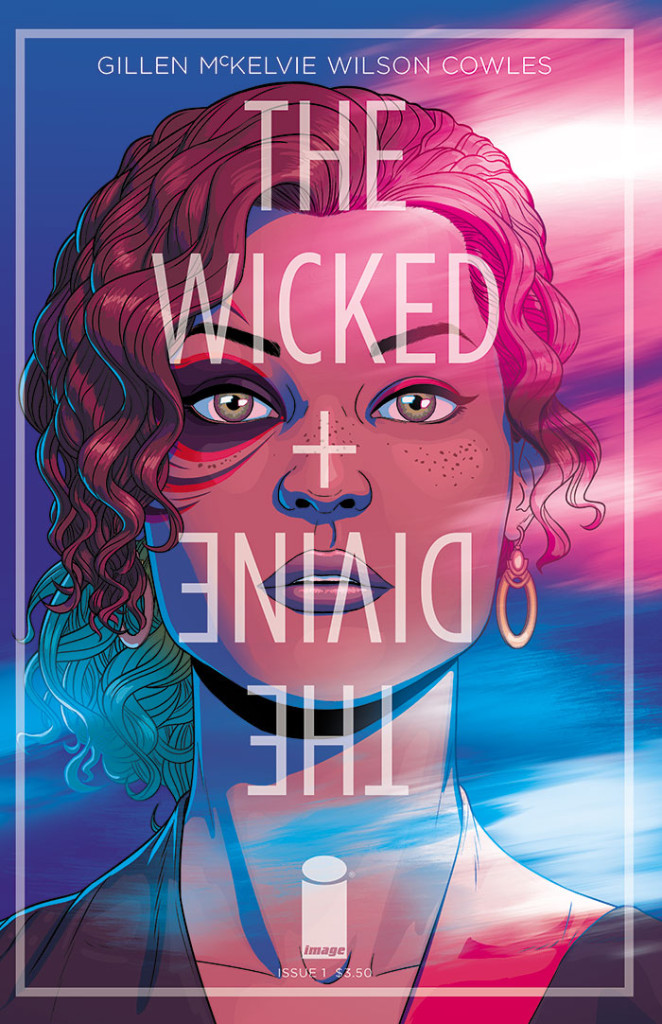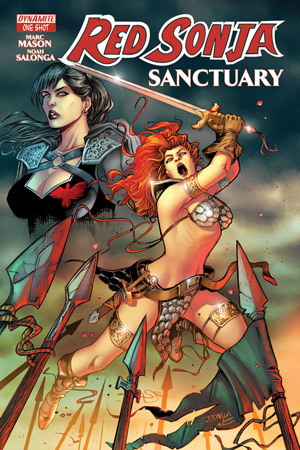We’re No. 1! is a weekly feature looking at first issues in new comic series, as well as one-offs and special releases. In his reviews, Jeff highlights stories with diverse characters and plot lines Geekquality readers can care about, as well as points out comics that miss the mark.
We’ll be keeping it short and sweet this week, but we wouldn’t want you to think that’s because there weren’t many great comics on your local store shelves this week. There were wizards, spaceships and adventures galore, but this week three really great books stood out above the rest of the new series.
 Possibly the most complex and wonderful new book in quite a long time is The Wicked and the Divine #1, from Image Comics. From the longstanding comics superstar team of Kieron Gillen and Jamie McKelvie, we’re presented with an unusual mythology: the gods of old have always been real, all of them, and every ninety years, twelve of them are incarnated as humans and walk among us. They are revered or loathed in equal measure, and then after two years, they die. The current crop exist in the open, proudly proclaiming their supernatural nature and living lives as super celebrity pop-stars. The sheer volume of action adventure in this first issues would be impressive, even without the fantastically original concept, and it’s a gripping plot line worthy of a read all on its own. But it’s the modern day imaging of these deities from across all spectrum of human mythology that’s so captivating, no matter what might be happening to them. I’d watch Lucifer, the Shinto god Amaterasu and Sakhmet reincarnated as three young women (with a heavy David Bowie fan thing going on), if they were just reading the paper and drinking tea. It’s exciting to imagine them as super celebrities, exceptionally unapologetic women with no fear of how the world sees them. Gillen’s story is about the worship of art and the fetishization of celebrity, about why people love the talented and the outspoken, but it’s told from the point of view of these gods. It turns the examination of religion and fervor into an exploration of identity in a masterful and original way not seen in comics before.
Possibly the most complex and wonderful new book in quite a long time is The Wicked and the Divine #1, from Image Comics. From the longstanding comics superstar team of Kieron Gillen and Jamie McKelvie, we’re presented with an unusual mythology: the gods of old have always been real, all of them, and every ninety years, twelve of them are incarnated as humans and walk among us. They are revered or loathed in equal measure, and then after two years, they die. The current crop exist in the open, proudly proclaiming their supernatural nature and living lives as super celebrity pop-stars. The sheer volume of action adventure in this first issues would be impressive, even without the fantastically original concept, and it’s a gripping plot line worthy of a read all on its own. But it’s the modern day imaging of these deities from across all spectrum of human mythology that’s so captivating, no matter what might be happening to them. I’d watch Lucifer, the Shinto god Amaterasu and Sakhmet reincarnated as three young women (with a heavy David Bowie fan thing going on), if they were just reading the paper and drinking tea. It’s exciting to imagine them as super celebrities, exceptionally unapologetic women with no fear of how the world sees them. Gillen’s story is about the worship of art and the fetishization of celebrity, about why people love the talented and the outspoken, but it’s told from the point of view of these gods. It turns the examination of religion and fervor into an exploration of identity in a masterful and original way not seen in comics before.
 The power of the classics, as it were, continues this week with the next chapter in IDW’s Kill Shakespeare saga with Kill Shakespeare: The Mask of Night #1. The series imagines all of The Bard’s various heroes existing simultaneously in the same world of adventure – a world where Will himself is both god and prophet, Hamlet makes the third point on Romeo and Juliet’s love triangle, and Othello joins the adventure to take on Lady Macbeth, Titus Andronicus and Prospero. In the latest chapter, Juliet, Hamlet, Shakespeare and Othello have escaped the magical island of The Tempest, only to be captured by pirates. True to their creative talents, writers Conor McCreery and Anthony Del Col have thrown an intriguing twist into this incarnation of Twelfth Night. Cesario is the pirate, and Viola is his very real lover. Instead of being the same person consistently in disguise as the man Cesario (sorry if I’ve just “spoiled” Twelfth Night for you), Viola is a violent and lustful woman, unapologetic about her love of the pirate’s life or of her captain, Cesario. While Cesario, who wears an unusual two faced mask while pirating, would love to throw in with Juliet and her rebellion against Titus, Viola scorns his ideas of fighting on the right side, or one day settling down to have a family. While Juliet has been shown to be a bastion of fortitude throughout the series, Viola is her opposite. Willful, angry and prone to violence, she is steadfast in her belief that she has the right to live her life as she chooses, and never at the whims of a man. If you love the Bard, or you just love a swashbuckling adventure filled with empowered women, this is a great introduction to the series (or just a really good excuse to go back and read them all!)
The power of the classics, as it were, continues this week with the next chapter in IDW’s Kill Shakespeare saga with Kill Shakespeare: The Mask of Night #1. The series imagines all of The Bard’s various heroes existing simultaneously in the same world of adventure – a world where Will himself is both god and prophet, Hamlet makes the third point on Romeo and Juliet’s love triangle, and Othello joins the adventure to take on Lady Macbeth, Titus Andronicus and Prospero. In the latest chapter, Juliet, Hamlet, Shakespeare and Othello have escaped the magical island of The Tempest, only to be captured by pirates. True to their creative talents, writers Conor McCreery and Anthony Del Col have thrown an intriguing twist into this incarnation of Twelfth Night. Cesario is the pirate, and Viola is his very real lover. Instead of being the same person consistently in disguise as the man Cesario (sorry if I’ve just “spoiled” Twelfth Night for you), Viola is a violent and lustful woman, unapologetic about her love of the pirate’s life or of her captain, Cesario. While Cesario, who wears an unusual two faced mask while pirating, would love to throw in with Juliet and her rebellion against Titus, Viola scorns his ideas of fighting on the right side, or one day settling down to have a family. While Juliet has been shown to be a bastion of fortitude throughout the series, Viola is her opposite. Willful, angry and prone to violence, she is steadfast in her belief that she has the right to live her life as she chooses, and never at the whims of a man. If you love the Bard, or you just love a swashbuckling adventure filled with empowered women, this is a great introduction to the series (or just a really good excuse to go back and read them all!)
 And speaking of women with agency and, you know, big swords: where would any week be without Red Sonja? This time around Dynamite brings us the One Shot Red Sonja: Sanctuary, and if there was ever a doubt that Sonja is one of the great female characters in comics, it’s time to put that to bed. Here, Sonja encounters a former adversary Raven, a warrior woman who, like Sonja, was saved and anointed by the goddess Scåthåch to act as her sword arm. While Sonja has taken up the mantle to protect the women (and none too few men) of her world, Raven approached her holy mission with a vengeance. Literally. Raven is willing to kill where even Sonja would not, and was bested by the She Devil some time back (this is all on the inside of the front cover, so if you aren’t reading the regular Red Sonja title, you’ll get the gist.) Sonja believed Raven had mistakenly taken in the daughter of a man she had killed, a young girl named Eleanor with her own secret need for vengeance. As the book opens, Sonja is tracking them and has come up against mercenaries seeking to bounty Raven or kill her. Sonja does her thing, leaving the mercenary leader to fear her wrath, and finds both the nearly grown Eleanor in Raven in a place she didn’t expect. They have built a sanctuary in an old castle, a place for the women of their medieval world to find some peace. Raven herself has abandoned violence all together after Eleanor was unable to go through with murdering her. The message here, of women helping each other, living and learning together and making a better world for themselves, is unquestionably a good one. The idea that Sonja herself would put aside the sword, and even the chain mail bikini, and take up a role as a teacher in this Sanctuary is appealing, but any fan of hers knows that this won’t last long. Sadly, the predictable plot twist (anyone wanna guess what happens to Raven when Sonja isn’t there to defend the women against a horrific raid) almost makes for a turn about on the message that writer Marc Mason is trying to give us. Sadly, there was very little doubt that this wonderful endeavor on the part of these women would fail and the story almost seems counter productive. Can women be strong and powerful? Yes, but it will cost them, we seem to be told. Obviously, from a narrative standpoint, Sonja needs to keep being who she is, the warrior woman, but it’s a tough pill to swallow that she may never find peace. Even tougher is the notion that women who build something whole and good for themselves, who attempt to control their own destinies and lives, will always be the targets of evil men who wish to harm them, of a world that will not accept such an idea. This is obviously where change needs to come, and the ultimate point is that Sonja can’t do this by herself. Change must come from the men of her world, and of ours, and not at the end of a sword, no matter who wields it. The book seems simple at first, but in the end proves thought provoking and valid.
And speaking of women with agency and, you know, big swords: where would any week be without Red Sonja? This time around Dynamite brings us the One Shot Red Sonja: Sanctuary, and if there was ever a doubt that Sonja is one of the great female characters in comics, it’s time to put that to bed. Here, Sonja encounters a former adversary Raven, a warrior woman who, like Sonja, was saved and anointed by the goddess Scåthåch to act as her sword arm. While Sonja has taken up the mantle to protect the women (and none too few men) of her world, Raven approached her holy mission with a vengeance. Literally. Raven is willing to kill where even Sonja would not, and was bested by the She Devil some time back (this is all on the inside of the front cover, so if you aren’t reading the regular Red Sonja title, you’ll get the gist.) Sonja believed Raven had mistakenly taken in the daughter of a man she had killed, a young girl named Eleanor with her own secret need for vengeance. As the book opens, Sonja is tracking them and has come up against mercenaries seeking to bounty Raven or kill her. Sonja does her thing, leaving the mercenary leader to fear her wrath, and finds both the nearly grown Eleanor in Raven in a place she didn’t expect. They have built a sanctuary in an old castle, a place for the women of their medieval world to find some peace. Raven herself has abandoned violence all together after Eleanor was unable to go through with murdering her. The message here, of women helping each other, living and learning together and making a better world for themselves, is unquestionably a good one. The idea that Sonja herself would put aside the sword, and even the chain mail bikini, and take up a role as a teacher in this Sanctuary is appealing, but any fan of hers knows that this won’t last long. Sadly, the predictable plot twist (anyone wanna guess what happens to Raven when Sonja isn’t there to defend the women against a horrific raid) almost makes for a turn about on the message that writer Marc Mason is trying to give us. Sadly, there was very little doubt that this wonderful endeavor on the part of these women would fail and the story almost seems counter productive. Can women be strong and powerful? Yes, but it will cost them, we seem to be told. Obviously, from a narrative standpoint, Sonja needs to keep being who she is, the warrior woman, but it’s a tough pill to swallow that she may never find peace. Even tougher is the notion that women who build something whole and good for themselves, who attempt to control their own destinies and lives, will always be the targets of evil men who wish to harm them, of a world that will not accept such an idea. This is obviously where change needs to come, and the ultimate point is that Sonja can’t do this by herself. Change must come from the men of her world, and of ours, and not at the end of a sword, no matter who wields it. The book seems simple at first, but in the end proves thought provoking and valid.

